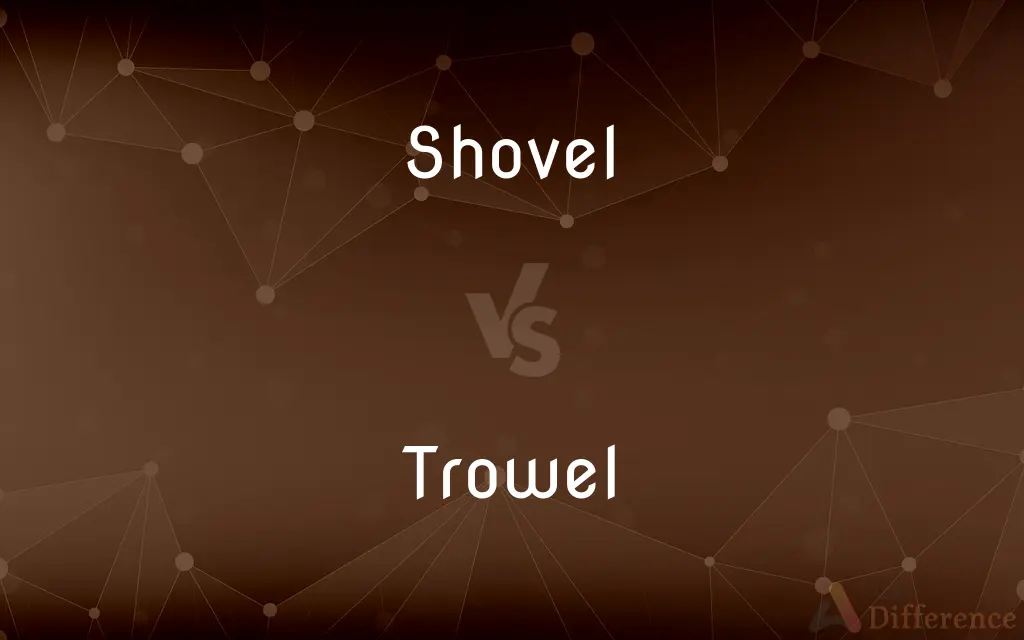Shovel vs. Trowel — What's the Difference?
By Maham Liaqat & Fiza Rafique — Updated on March 9, 2024
A shovel is a large tool for digging, lifting, and moving bulk materials, featuring a broad blade and typically a long handle, whereas a trowel is a small hand tool with a pointed, scoop-shaped metal blade, used for digging small holes.

Difference Between Shovel and Trowel
Table of Contents
ADVERTISEMENT
Key Differences
Shovels are designed for heavier, larger-scale tasks in gardening, construction, and other outdoor activities. They come with a broad blade and a long handle, which allows the user to leverage their body weight and force to dig into the ground or lift heavy materials such as soil, sand, or snow. On the other hand, a trowel is much smaller and is primarily used for precision tasks in gardening, such as planting seedlings, transplanting flowers, digging small holes, or weeding.
The design of a shovel is optimized for efficiency in moving large volumes of material with each motion, making it ideal for big projects like digging holes, transferring dirt, or clearing snow. The trowel's pointed and scoop-shaped blade makes it perfect for working in tight spaces or with delicate plants, where control and gentleness are paramount. Additionally, trowels are commonly used in masonry for applying and smoothing small amounts of mortar or plaster.
The difference in handle length between the two tools is also significant. Shovels usually have longer handles, which provide greater leverage and allow for digging or lifting without the need to bend over significantly, reducing strain on the user's back. Trowels, being hand tools, have short handles that offer precise control for close-up work.
Material handling capacity is another key difference. Shovels are capable of scooping and moving large amounts of material at once due to their size and shape. Trowels, however, are designed for much smaller volumes, focusing on precision and detail rather than bulk material movement.
While both shovels and trowels are essential tools in gardening and construction, their uses differ markedly. Shovels are best suited for large-scale, heavy-duty tasks requiring the movement of bulk materials, while trowels excel in precision work, planting, and detailed masonry tasks.
ADVERTISEMENT
Comparison Chart
Primary Use
Digging, lifting, and moving bulk materials
Digging small holes, planting, smoothing materials
Size
Large with a broad blade and long handle
Small with a pointed, scoop-shaped blade
Handle Length
Long, for leverage and reducing back strain
Short, for precise control and close-up work
Material Capacity
Designed for moving large volumes of material
Suitable for small amounts, detailed work
Common Uses
Gardening, construction, snow removal
Gardening, masonry, applying mortar or plaster
Compare with Definitions
Shovel
Designed for heavy-duty tasks like digging and lifting.
We'll need a sturdy shovel to dig this hole.
Trowel
Features a pointed, scoop-shaped blade for detail work.
The trowel's pointed tip made it easy to dig the perfect hole for the bulbs.
Shovel
Essential for large-scale gardening and construction projects.
Every gardener needs a reliable shovel for spring planting.
Trowel
Short handle provides precise control.
The trowel's short handle allowed for delicate manipulation of the soil.
Shovel
Characterized by a long handle for efficiency.
The long handle of the shovel made the work easier on my back.
Trowel
Commonly used in masonry to apply and smooth materials.
The mason expertly applied the mortar with a trowel.
Shovel
Suitable for a variety of materials, including soil and snow.
She grabbed a shovel to move the compost to the garden bed.
Trowel
Ideal for tight spaces and delicate tasks.
With her trowel, she carefully weeded around the young plants.
Shovel
A tool for moving bulk materials, featuring a broad blade.
He used a shovel to clear the driveway after the snowstorm.
Trowel
A trowel is a small hand tool used for digging, applying, smoothing, or moving small amounts of viscous or particulate material. Common varieties include the masonry trowel, garden trowel, and float trowel.
Shovel
A shovel is a tool for digging, lifting, and moving bulk materials, such as soil, coal, gravel, snow, sand, or ore. Most shovels are hand tools consisting of a broad blade fixed to a medium-length handle.
Trowel
A small hand tool for precise gardening and masonry work.
He used a trowel to plant the seedlings in the garden.
Shovel
A tool with a handle and a broad scoop or blade for digging and moving material, such as dirt or snow.
Trowel
A flat-bladed hand tool for leveling, spreading, or shaping substances such as concrete or mortar.
Shovel
A large mechanical device or vehicle for heavy digging or excavation.
Trowel
A small implement with a pointed, scoop-shaped blade used for digging, as in setting plants.
Shovel
The amount that a shovel can hold; a shovelful
One shovel of dirt.
Trowel
To spread, smooth, form, or scoop with a trowel.
Shovel
To move or remove with a shovel.
Trowel
A mason’s tool, used in spreading and dressing mortar, and breaking bricks to shape them.
Shovel
To make with a shovel
Shoveled a path through the snow.
Trowel
A gardener’s tool, shaped like a scoop, used in taking up plants, stirring soil etc.
I need to dig a hole for these begonias; would you pass me that trowel?
Shovel
To convey or throw in a rough or hasty way, as if with a shovel
He shoveled the food into his mouth.
Trowel
A tool used for smoothing a mold.
Shovel
To clear or excavate with or as if with a shovel
Shoveling off the driveway after the snowstorm.
Shovels out the hall closet once a year.
Trowel
(transitive) To apply (a substance) with a trowel.
He troweled the coarse mix with a twist, leaving a pattern of arcs.
Shovel
To dig or work with a shovel.
Trowel
(transitive) To pass over with a trowel.
Shovel
A hand tool with a handle, used for moving portions of material such as earth, snow, and grain from one place to another, with some forms also used for digging. Not to be confused with a spade, which is designed solely for small-scale digging and incidental tasks such as chopping of small roots.
Trowel
To apply something heavily or unsubtly.
Shovel
A mechanical part of an excavator with a similar function.
Trowel
A mason's tool, used in spreading and dressing mortar, and breaking bricks to shape them.
Shovel
(US) A spade.
Trowel
A gardener's tool, somewhat like a scoop, used in taking up plants, stirring the earth, etc.
Shovel
To move materials with a shovel.
The workers were shovelling gravel and tarmac into the pothole in the road.
After the blizzard, we shoveled the driveway for the next two days.
I don't mind shoveling, but using a pickaxe hurts my back terribly.
Trowel
A tool used for smoothing a mold.
Shovel
To move with a shoveling motion.
Already late for work, I shovelled breakfast into my mouth as fast as possible.
Trowel
A small hand tool with a handle and flat metal blade; used for scooping or spreading plaster or similar materials
Shovel
An implement consisting of a broad scoop, or more or less hollow blade, with a handle, used for lifting and throwing earth, coal, grain, or other loose substances.
Trowel
Use a trowel on; for light garden work or plaster work
Shovel
To take up and throw with a shovel; as, to shovel earth into a heap, or into a cart, or out of a pit.
Shovel
To gather up as with a shovel.
Shovel
A hand tool for lifting loose material; consists of a curved container or scoop and a handle
Shovel
The quantity a shovel can hold
Shovel
A fire iron consisting of a small shovel used to scoop coals or ashes in a fireplace
Shovel
A machine for excavating
Shovel
Dig with or as if with a shovel;
Shovel sand
He shovelled in the backyard all afternoon long
Common Curiosities
Is a shovel or trowel better for gardening?
It depends on the task; shovels are better for big jobs like digging or moving soil, while trowels are ideal for planting and detailed work.
Can a trowel be used for applying cement?
Yes, trowels are commonly used in masonry for applying and smoothing cement, mortar, or plaster.
Can both tools be used in any type of soil?
Yes, but the effort and efficiency will vary depending on the soil type and the appropriateness of the tool for the task.
Can you use a trowel for the same tasks as a shovel?
Not effectively; trowels are designed for smaller, more precise tasks, while shovels handle larger-scale work.
Is one tool more important than the other in construction?
Both are essential, serving different purposes; shovels for bulk material handling and trowels for detailed, finishing work.
How do you choose the right shovel or trowel?
Consider the specific task, the material you'll be working with, and the tool's size and shape for efficiency and comfort.
Are there different types of shovels and trowels?
Yes, both come in various shapes and sizes tailored to specific tasks, like spade shovels for digging or pointing trowels for masonry.
Why do shovels have long handles?
To provide leverage and allow the user to dig or lift with less strain on the back.
How long do these tools typically last?
With proper care, both can last many years. Durability often depends on the material quality and maintenance.
Is ergonomic design important for shovels and trowels?
Absolutely, ergonomic designs reduce strain and increase comfort, particularly for tasks requiring extended use.
Share Your Discovery

Previous Comparison
String vs. Strand
Next Comparison
Group vs. CommunityAuthor Spotlight
Written by
Maham LiaqatCo-written by
Fiza RafiqueFiza Rafique is a skilled content writer at AskDifference.com, where she meticulously refines and enhances written pieces. Drawing from her vast editorial expertise, Fiza ensures clarity, accuracy, and precision in every article. Passionate about language, she continually seeks to elevate the quality of content for readers worldwide.














































